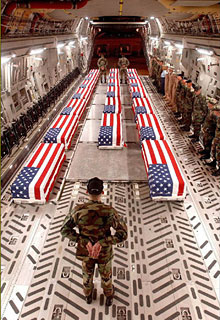
|  |  |  Editorials | Opinions | March 2009 Editorials | Opinions | March 2009  
Gates Did the Right Thing on Military Coffin Photos
 Arthur I. Cyr - Capitol Hill Blue Arthur I. Cyr - Capitol Hill Blue
go to original


| | Coffins of US millitary personnel are ready to be offloaded at Dover Air Force Base in Dover. (Reuters) |  |
Without fanfare, Secretary of Defense Robert Gates has reversed policy regarding photographing coffins bearing bodies of military personnel killed overseas. On the eve of the invasion of Iraq, the Bush administration banned such photography at military bases. The new policy permits photography as long as the immediate family agrees. Gates stated Pentagon opinion was divided but he found the Army's argument for change persuasive.

Representatives of the Bush administration usually did not discuss the matter, except for occasional statements about protecting privacy of grieving families. Politics, however, also clearly was a factor. That White House also discouraged coverage of military funerals at Arlington National Cemetery, while encouraging attention to patriotic ceremonies that did not highlight Iraq and Afghanistan war dead.

Ceremonial honoring of the war dead in fact is vital to society. From ancient times, honoring warriors has been central to the solace of families and also reintegration of the survivors of battle. Even the rare man who finds combat invigorating and rewarding is in severe need of a civilizing welcome after the killing ends.

Homer, chronicler of the Trojan War, was extremely sensitive to this. The great classic is presented in two parts. 'The Iliad' focuses on the fighting and related interplay involving Greeks and Trojans; 'The Odyssey' describes the very long voyage home of Greek leader Ulysses and his men as they traverse allegorical geography. Warriors still alive remain bound to dead comrades; the challenge is reconnecting the essential emotional tie of family.

Gen. George S. Patton Jr., a very great American combat leader, was also extremely mindful of this dimension. In 1945 he and Gen. James Doolittle, who led the first air raid on Tokyo, were featured in a special ceremony in the Los Angeles Coliseum after the surrender of Nazi Germany.

Patton celebrated the accomplishments of the U.S. Third Army in the victorious drive across Europe. In honoring his troops, he stressed in particular the 40,000 who lost their lives in that final year of the war. Patton publicly regularly recognized the fallen in the few months remaining until his own death.

Such confirmation is particularly important for warriors representing modern democracies. Our egalitarian ethos and efforts to abide by the rule of law contrast starkly with the traditional martial spirit.

Our modern conflicts have usually encouraged such ceremonies of honor. In World War II, Allied troops were often welcomed warmly by peoples liberated from Axis occupation. The first Gulf War likewise freed an oppressed population. The Korean War created very strong bonds between the U.S. and the people of South Korea as well a very effective military for our ally.

The Vietnam War was different. Military personnel were actively discouraged from public discussion of the subject. Public opposition to the war became hostility to our military. There was no collective welcome home. Many middle aged vets of that war continue to suffer without a Ulysses, emotionally stranded, troubled -- and sometimes troublesome.

One indirect benefit of the new policy announced by Secretary Gates may be encouragement of veterans to run for public office. We won the Cold War in part because members of Tom Brokaw's "Greatest Generation'' who served in the military also served in government.

Every U.S. President from Harry Truman through George H.W. Bush was a veteran. What Washington needs above all is the sort of sensible realism such men and women often bring to policy.

(Arthur I. Cyr is Clausen Distinguished Professor at Carthage College in Wisconsin. Contact him at acyr@carthage.edu.) |

 |
|  |



